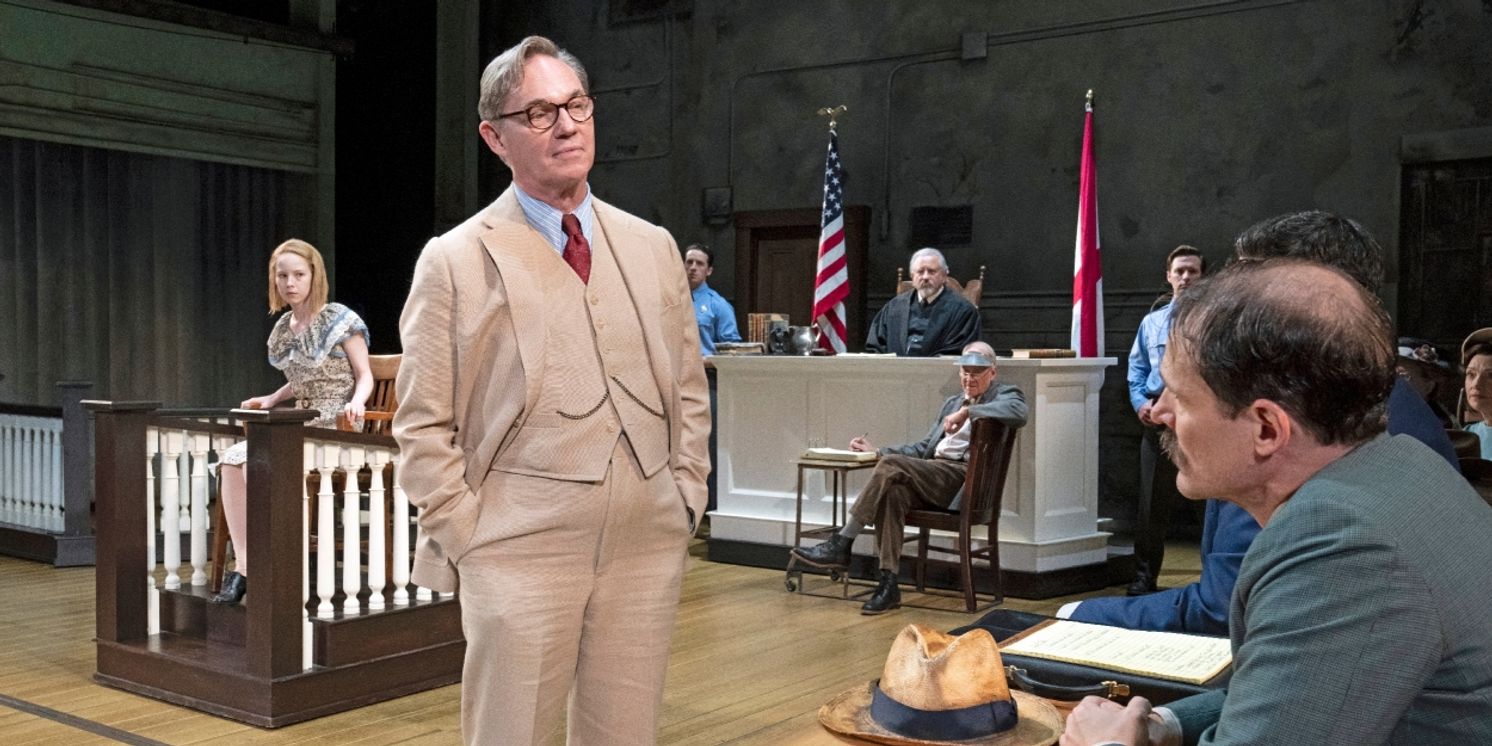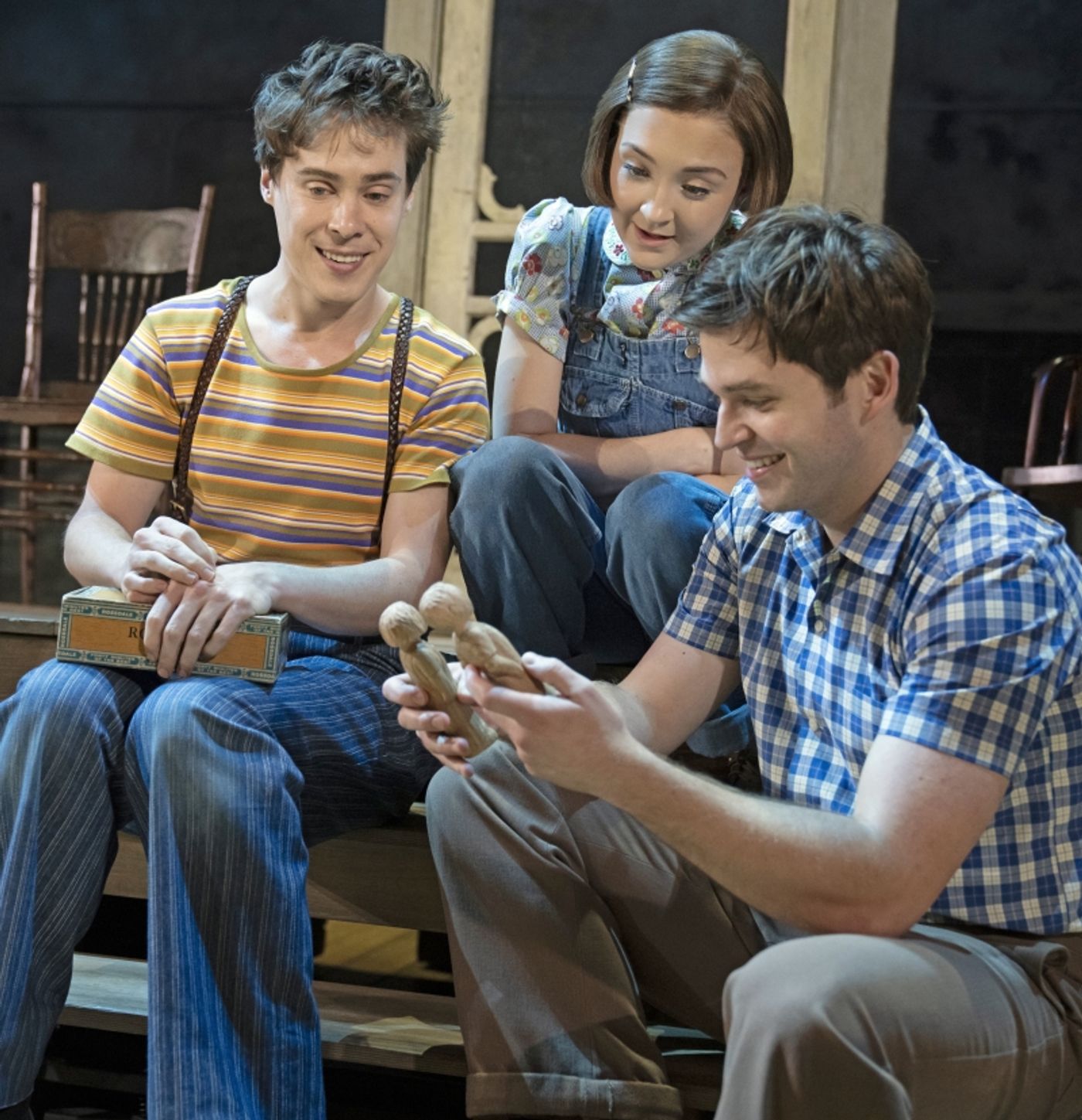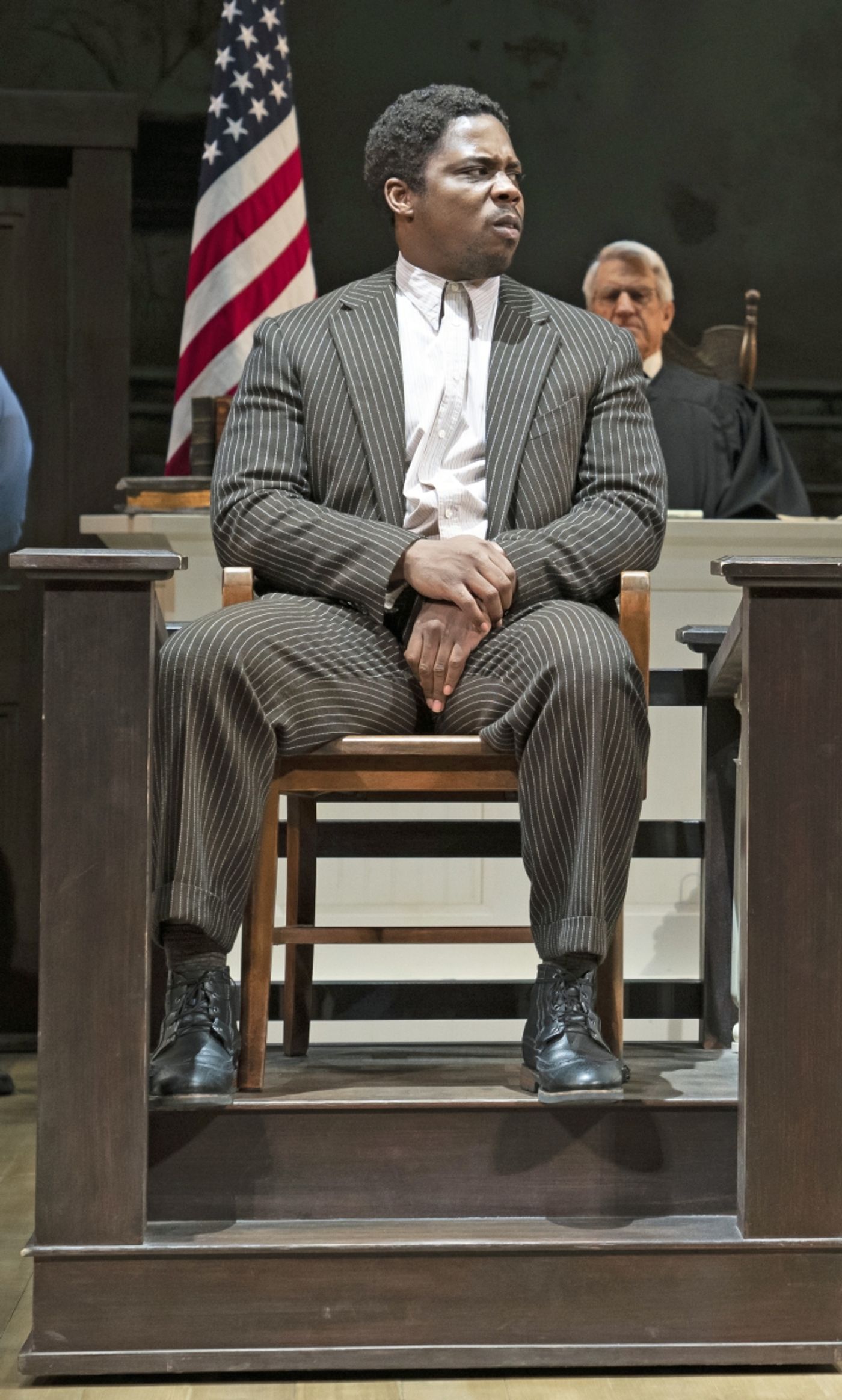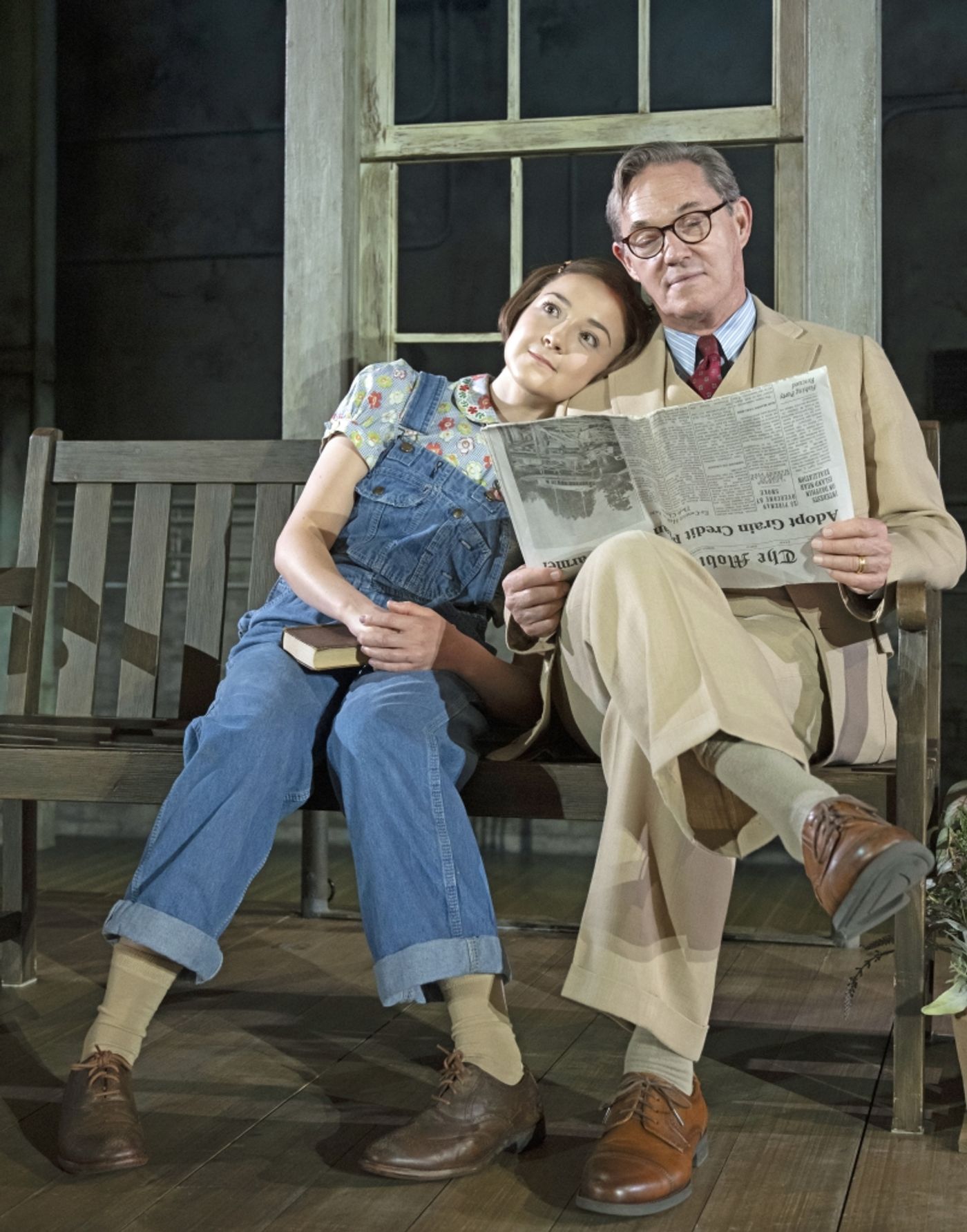Review: TO KILL A MOCKINGBIRD at KC Music Hall
from the American Theater Guild through October 29

Aaron Sorkin’s 2018 stage re-imagination of the classic Harper Lee novel “To Kill A Mockingbird” opened Tuesday at the Kansas City Music Hall for a one week run. It is one of the finest touring companies of any play I’ve been privileged to witness in many years. “Mockingbird” stars well-known actor Richard Thomas in a stellar turn as the lead character of Atticus Finch.

items in the crook of the oak tree
“Mockingbird” recounts a 1934 fictional capital rape trial of a large black man accused of assault by a poverty stricken and abused, nineteen year-old white woman and its aftermath in the depression era rural South. The fictional location is Maycomb, Alabama. The story is told in flashback by three young people alternately as rotating narrators and active participants.
The roots of the story are said to go back to a similar trial in 1936 and autobiographical sources from Harper Lee’s own real childhood home; Monroeville, Alabama. Dill Harris was inspired by Lee’s lifelong friend and childhood neighbor, the author Truman Capote.
As an adult, Lee became Capote’s muse and partner during the writing of Capote’s own non-fiction classic “In Cold Blood” about a horrific Iowa serial murder case. Forensic examination of the “Mockingbird” manuscript suggests that Capote may have assisted with some early chapters.

tea inside the Finch home
Atticus Finch (Richard Thomas) is a well-liked and admired, honest country lawyer whose stock and trade is real property and life estate work rather than criminal defense. Atticus is widowed. He is Dad to two teen-aged children Scout (Melanie Moore) and Jem (Justin Mark). Atticus is surrogate Dad to his children’s friend Dill Harris (Steven Lee Johnson). The family’s long-time black housekeeper/family retainer, Calpurnia (Jacqueline Williams) is among Atticus’s closest confidants. He respects her opinion while not always understanding her reality.
The three young people frolic that summer as one would expect young people without benefit of the yet to be invented television set to do. They make their own fun and get in moderate amounts of trouble. Atticus is a patient loving father, correcting when needed; comforting when necessary. The young people are understandably curious.

the witness box in his own defense
The occupant of one nearby home is a man nicknamed Boo Radley (Ian Bedford). Boo is seldom seen in daylight and is an object of fear and wonder to the children. Boo, it has been speculated, may have lived somewhere on the autism spectrum. He may have spent his time watching the neighborhood and manufacturing small crafts. Boo's actual existence is confirmed separately by Copote. The teens seem to delight in spying on this person they seldom see. Atticus encourages tolerance and respect for Boo.
The original novel released in 1960. “Mockingbird” fused with the civil rights struggle culture and high school reading lists immediately. Within two years, an Academy Award winning screenplay by Horton Foote and a film starring Gregory Peck as Atticus was released. Peck earned an Academy Award and the film was soon declared a classic by the Library of Congress. The film is Peck’s self identified legacy. Sorkin’s Atticus Finch is more nuanced than the 1962 film version.
In Sorkin’s play, Atticus is solicited by his friend, a local trial judge named Taylor (Jeff Still), to defend the black defendant already in custody. He is a kindly giant of a man named Tom Robinson (Yaegel T. Welch). Tom gets into the habit of doing small chores for a young white woman on his way home.
Judge Taylor is concerned that Tom will not receive a fair trial. Fictional Maycomb is a very small town in the Jim Crow South in an area when the Ku Klux Klan is active. Everyone knows everyone. Members of the Klan have infected many institutions of society. Both Judge Taylor and Atticus know, based on evidence, that Tom could not have committed the crime. Judge Taylor tells Atticus that Tom Robinson’s court appointed lawyer has recommended he plead guilty to avoid a likely death penalty.

Reluctantly, Atticus sees Tom Robinson. Atticus tells Tom that the worst that can happen is a conviction reversed upon appeal. Atticus believes his community will be fair. Atticus is wrong. He has no appreciation for the separate reality of African-Americans in the Jim Crow South up to (at least) the actual publication date of the source novel.
The complaining witness is Mayella Ewell (Mariah Lee). She is egged on by her abusive, racist, anti-Semitic father, Bob Ewell (Ted Koch). The first words out of Bob Ewell’s mouth reveal who he is and he continues to dig his hole ever deeper every time he speaks.
Bob threatens and attempts to intimidate Atticus at home. Atticus defuses the threat and makes Bob retreat. Later, Ewell and a mob of KKK friends attempt to break Tom out of the jail and hang both him and his lawyer before the verdict. They are saved when Scout recognizes one of the Klansmen and shames he and his mates into giving up.
There is no real evidence against Tom Robinson. No medical examination was conducted on the supposed victim. The injuries recounted by Sheriff Tate (Travis Johns) would have required an able bodied undamaged man. Judging from the damage observed, he was probably left handed. The father, Bob Ewell, demonstrates that he is left handed. Atticus’s cross examination of Bob Ewell reveals the venom of the man and enrages him to the point that the Judge has him escorted from the court.
The examination of the complaining witness and the accused establish that there is no reason to assume guilt other than the accusation itself. Tom Robinson has lived without the use of his left arm since a catastrophic farm accident suffered when he was an eleven year-old. He cannot have been the attacker.

Following Atticus’s impassioned closing argument, an all-white twelve-man jury condemns Tom Robinson to death. Atticus is disappointed, but remains hopeful an appeal will reverse the conviction.
Later, Tom is transferred to the state prison. Atticus is notified that Tom has attempted escape and been shot dead. According to the notification, the one-armed prisoner ran and attempted to scale a high fence before being cut down by multiple rifle shots. His appeal will never be heard.
Bob Ewell makes a final visit to the Finch home. He is still angry at having been revealed in court. He threatens Atticus. After attempting reason, Atticus Finch has had enough. He disarms Ewell, twists one arm behind his back and gets him in a choke hold before stopping himself.
The summer passes. Scout attends a fall school event in costume. Bob Ewell has not forgotten his humiliation. He attacks Scout and breaks Jem’s arm. Only the thickness of her holiday costume saves Scout from being knifed. The seldom seen Boo Radley witnesses the attack and comes to the rescue with a whittling knife. Bob Ewell is dead. Sheriff Tate and Judge Taylor convince Atticus that no good can come from further litigation. It is determined that Bob Ewell tripped and fell on his own knife.
Aaron Sorkin’s play is a remarkably ingenious construction. Using the children as the vehicle, he references the death of Bob Ewell from a newspaper story at the opening of the first act. The audience does not find out the significance of the early reference until very much later.
The characters evolve and change throughout the course of the play. We see Atticus transform from someone who wants “to go along to get along” and modestly raise good children to someone who understands other points of view. The children grow and mature. They get to understand the benign racism under the surface of their neighbors’ pleasant attitudes. They come to appreciate the issues that spawned the Civil War are not far removed from their every days.
Sorkin’s real genius is his ability with dialog. The story is exactly the story that Harper Lee told in the source book. It is pretty dark, but in Aaron Sorkin’s hands there is a surprising amount of humor to be had. We like many of these people. Some we hate, but most are worth knowing.
The actors especially Atticus (Thomas), Scout (Moore), Jem (Mark), Dill (Johnson), and Calpurnia (Williams) take the masterful dialog and the possible rhythms and run with them. Supporting actors and characters are uniformly excellent.
The sets by Miriam Buether are simple yet effective. They fly in and out, roll in and out from the wings, and change quickly and flawlessly. They seem to appear and disappear from all directions at once. I had to look to see if there was a sound designer. He is Scott Lehrer. From where I sat, artificial sound amplification was indistinguishable. I was able to hear every word. Director Bartlett Sher has done a wonderful stitching all this together.
A short side note. The small role of the crusty Mrs. Dubose is portrayed by Mary Badham. Ms. Badham was featured as a preteen “Scout” in the 1962 film version with Gregory Peck.
“To Kill A Mockingbird” continues at the Music Hall through Sunday, October 29. I recommend it highly. I have shared the story. You need to see this performance. Tickets may still be available at www.americantheaterguild.org or by telephoning 816-421-7500.
Photos by Shelby DuPont.
Reader Reviews

Videos

